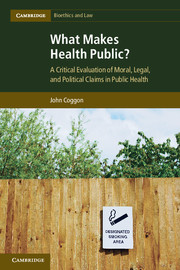 What Makes Health Public?
What Makes Health Public? Book contents
- Frontmatter
- Contents
- Foreword
- Acknowledgements
- What makes health public?
- Part I Basic concepts in public health
- 1 Health, normativity, and politics
- 2 The public, and things being public
- 3 The seven faces of public health
- 4 Public health policy
- 5 Public health law and ethics
- 6 Conclusion to Part I
- Part II Evaluating evaluations: making health public
- Part III Tackling responsibility: liberal citizens as subjects and sovereigns
- Bibliography
- Index
6 - Conclusion to Part I
from Part I - Basic concepts in public health
Published online by Cambridge University Press: 05 June 2012
- Frontmatter
- Contents
- Foreword
- Acknowledgements
- What makes health public?
- Part I Basic concepts in public health
- 1 Health, normativity, and politics
- 2 The public, and things being public
- 3 The seven faces of public health
- 4 Public health policy
- 5 Public health law and ethics
- 6 Conclusion to Part I
- Part II Evaluating evaluations: making health public
- Part III Tackling responsibility: liberal citizens as subjects and sovereigns
- Bibliography
- Index
Summary
While health is considered to be of such high concern that we should specifically consider the law that does, might, and should relate to it, (public) health law and ethics break down where and to the extent that this central concept is either many things, or an uncertain thing. This raises difficulties. If of necessity policy-makers must embrace a value-laden concept of what is good for us, there is going to be radical disagreement about the concept, and thus of what founds appropriate political measures. We need to respond to this in analysis and public debate. Health-based laws and policies relate to those aspects of health that are deemed to be a shared concern, and thus on which effective value-claims must be made. Above I reviewed some of the key aspects of the literature on the philosophy of health, and clearly there is a wealth of alternative definitions that we must be aware of as we approach analyses of public health.
It is arguable that public health, and public health law and ethics, may in some senses be the logical culmination of normative concepts of health. But if we are to advance useful analyses, or develop defensible policies, looking for conclusive political answers within ‘public health’ is going to be fruitless. The term ‘public health’ juxtaposes two widely contestable, distinctly normative terms, and has become in many instances usurped as a ‘tool’ in political, legal, and ethical argumentation. We have seen how it can serve as something that drives rather than is driven by wider normative considerations. This is not to say that in its different guises it reflects bad or useless things. But there is, quite simply, too much going on conceptually. The term ‘public health’ often affords a good shorthand, provided its contextualised meaning is clear, but as a concept it is less illuminating and limiting than some may think or hope. We can turn recognition of this to our advantage, by considering a positive point: there is much in the concepts of health and of public that can help us to develop practically useful ethical, legal, and political analyses. Ultimately, it does not matter so much what ‘public health’ means. What is important is the overall framing of our social interactions. To know how purported ‘public health issues’ fit into this, we need arguments that lead to an idea of what health is taken to mean in a given instance, and what would make it public.
- Type
- Chapter
- Information
- What Makes Health Public?A Critical Evaluation of Moral, Legal, and Political Claims in Public Health, pp. 95 - 96Publisher: Cambridge University PressPrint publication year: 2012
